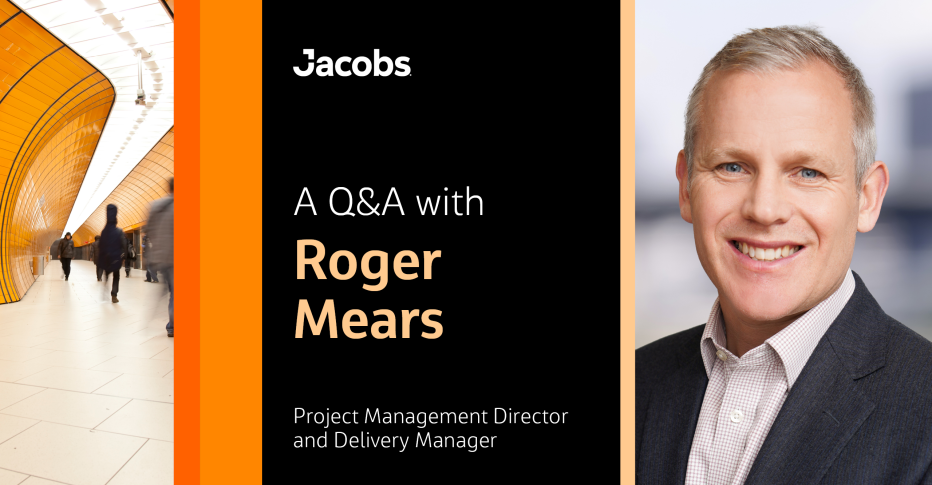
Building a super sewer beneath one of the world’s busiest cities is no small feat. The scale of the Tideway program in London is staggering: a 16-mile tunnel, 70 meters deep at its lowest point, with a capacity equal to 640 Olympic-sized swimming pools. It’s the largest water infrastructure project ever undertaken in the U.K.
This scale and complexity set the tone for the high level of delivery required—including exceptional stakeholder engagement, safety and quality standards.
Roger is one of the leaders responsible for meeting these expectations. With experience on programs like Tideway and Crossrail, he draws on deep contract knowledge, practical risk management and a focus on empowering high-performing teams. In this Q&A, Roger Mears shares lessons learned and opportunities ahead.
Tell us about your current role and how risk management is critical to program success.
As Delivery Manager, I oversee one of the three geographically defined contracts on Tideway. Each is worth more than $1 billion in long-term contracts and spans roughly 10 years.
If I had to describe my role in two words, I’d choose ‘counselor’ and ‘listener.’ My job is about carefully listening to understand technical challenges and then working with teams to deliver the right solutions. I act as a go-between for the client and contractor in a decade-long relationship. It’s about getting things done and delivered by absorbing the right information and then making the best decisions for the program for the client, communities, end users and environment.
We’re tunneling through central London and connecting to existing sewers at 20 points along the River Thames. That means high safety and environmental standards, plus protecting historical infrastructure. With a planned 120-year design life, the program demands exceptional design and construction quality.
But conditions change over time. What was specified early on may no longer be suitable, requiring new contractual solutions.
Our job is to provide program certainty—when it will be finished, and how much it will cost. That takes clear risk definition, accurate cost forecasting, ongoing scope analysis and solid program governance. It also relies on effective contract management within the New Engineering Contract (NEC3) framework and ability to fairly allocate risk and reward across the supply chain. My previous experience with NEC3 has been invaluable in making this work.
What are the current challenges facing program management in the U.K. and Ireland?
One major challenge is the inconsistent and dispersed pipeline of work. It impacts the industry’s ability to invest in talent and technology long-term.
I’ve been fortunate to work on large-scale programs like Crossrail and Tideway. Although they span different sectors — rail and water— many of the skills and approaches overlap. We’ve been able to build new governance models, create agile teams and offer leadership opportunities that have helped people grow and deliver better outcomes.
The industry's challenge , and something I worry about daily, is ensuring my team can progress their careers over the medium to long term and get crucial experience in large-scale program management for their careers and better program outcomes. Understanding this challenge and working with clients and Jacobs to ensure we give talented people the right opportunities is a big focus for me.
Where do you see the biggest opportunities in program management?
In Europe, I don’t see many competitors with the same depth of experience our teams bring — especially in dense urban environments like London. We’ve built a strong track record on programs such as Crossrail, Lower Thames Crossing, SuedLink, Dunkettle Interchange Upgrade, BusConnects Cork Sustainable Transport Corridors program and the London 2012 Olympics and Paralympic Games.
If I had to choose specific sectors for program advisory opportunities, the transportation and water sectors are high-growth areas in Europe, especially in the U.K. As a differentiator, Jacobs can support clients in delivering their schemes right from the early development phase to initial design and planning and then to delivery, working with our supply chain and key contractors.
How do you drive better results when working with external organizations?
It starts with understanding their motivations and what’s important to them. The client’s mission is our North Star but we also need to consider what the end users need and expect.
Then, you need to integrate all the partners’ motivations into one mission. You need to bring them all on board at the start, but critically, ensure you understand all their capabilities and drivers throughout the program lifecycle.
This commonality of goals and constant course correction are critical for success. If your partners start going in different directions, it leads to wasted time and effort at best and program overruns at worst. Clients and partner objectives will change subtly and you need to be aware of them. When it happens, difficult conversations need to be had to bring things back into alignment and contractual obligations—which also underscores the value of a well-defined, risk-apportioned contract.
How will program contracts change in the future?
The NEC contract used on Tideway — originally NEC3 and now evolving into NEC4— is widely used in the U.K. It continues to adapt, but its core strength remains: clearly defining risk and responsibility while fostering the right program culture.
We need to be cautious when modifying these templates. Moving too far from the standard NEC3 framework can lead to unexpected issues. You also lose the benefit of two decades of industry expertise that’s been built around these models — including alternatives like the Direct Procurement for Customers (DPC) model and the Specified Infrastructure Project Regulations (SIPR) model.
About the author

Roger Mears is an experienced project manager with more than 20 years of experience in civil engineering in the U.K. and abroad. Roger is skilled in construction and contract management on civil engineering and tunneling projects. He has worked across rail, water, highway and aviation sectors and has held leadership roles both contractor (direct hire and subcontract management roles) and project management organizations.












































